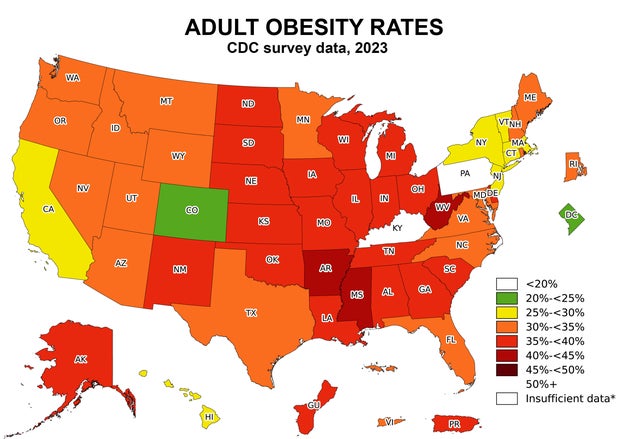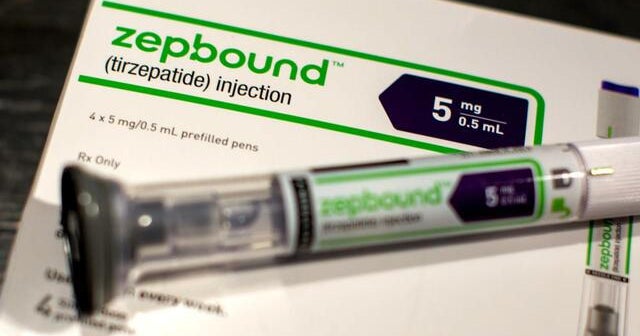CBS News
Obesity rate in U.S. adults no longer growing, new CDC data suggests

Around 40% of adults in the U.S. are obese, new data from the Centers for Disease Control and Prevention suggests — marking the first time in over a decade that the nation’s obesity rate has not inched up in results from the federal government’s national health survey.
The figures come from a new report by the CDC’s National Center for Health Statistics, analyzing data collected through the agency’s decadeslong National Health and Nutrition Examination Survey nationwide.
In 2000, the survey estimated that around 30% of adults were obese, defined as having a body mass index of greater than or equal to 30. By 2020, the CDC’s estimate of the adult obesity rate had climbed to 41.9%.
Now the CDC estimates that 40.3% of adults are obese, looking at survey data from 2021 through 2023.
While the difference from 2020 to 2023 was too small to be counted as a statistically significant decrease, the modest decline breaks a streak of rates that had been increasing virtually every year since 2011.
“In the United States, the prevalence of obesity in adults remains above the Healthy People 2030 goal of 36.0%,” the agency said in the report, citing the federal government’s official goal to reduce the share of Americans who are overweight or obese.
Obesity rates remain highest among adults 40 to 59 years old, at 46.4%. Rates are lowest among those 20 to 39 years old, at 35.5%.
Severe obesity rates continue to increase, the CDC’s survey also found. Adjusted for age, the prevalence of adults with a BMI of greater than or equal to 40 increased from 7.7% to 9.4%.
At these higher ranges of obesity, the National Institutes of Health warns that people are at the greatest risk of the diseases that are linked with weight gain, like heart disease and diabetes.
Map shows states with highest, lowest obesity rates
The new figures come just a week after the CDC released its state map of obesity rates around the country, based on results from a different ongoing survey run by the agency, which found that more than a third of adults in 23 states were obese in 2023. That is up from no states with more than a third of residents being obese a decade ago in 2013.
Only the District of Columbia and Colorado had less than a quarter of residents who were obese in 2023. That’s down from seven states and D.C. that had rates below 25% in 2013.
U.S. Centers for Disease Control and Prevention
“This new data highlight the need for obesity prevention and treatment options, which start with building healthier communities where people of all ages have safe places for physical activity, and where health care and healthy food options are accessible and affordable for all,” Dr. Karen Hacker, head of the CDC’s National Center for Chronic Disease Prevention and Health Promotion, said in a statement following the map’s release.
The release of the new CDC figures also comes ahead of a Senate Health, Education, Labor and Pensions committee hearing with the chief executive officer of Novo Nordisk, questioning the drugmaker for the high prices it charges for its blockbuster semaglutide drugs, branded as Ozempic for diabetes and Wegovy for weight loss.
A surge of demand for Novo Nordisk’s drugs, as well as similar tirzepatide drugs made by rival Eli Lilly branded as Zepbound for weight loss and Mounjaro for diabetes, have landed them on the Food and Drug Administration’s shortage list for years.
“Epidemiologists have estimated that more than 40,000 lives per year could be saved if Wegovy and other weight-loss drugs were made affordable and widely available in the United States,” the panel, led by Democrats and Vermont Independent Senator Bernie Sanders, said in a release ahead of the hearing.
CBS News
Map shows Trump’s 2024 election victory came as voters shifted red across the country

While the 2024 presidential election was among the closest in recent memory — with President-elect Donald Trump ahead by about 3 percentage points over Vice President Kamala Harris — Trump’s vote share grew in a diverse array of regions across the country and across different demographic groups.
It’s the first time in Trump’s three campaigns for the White House that he’s topped his opponent in the popular vote, and only the second time since 1988 that any Republican has done so. In 2016, former Secretary of State Hillary Clinton won almost 66 million votes (48%), compared to Trump’s nearly 63 million (46%), but Trump won the Electoral College. In 2020, he lost both the Electoral College and the popular vote to President Biden, who received about 81 million votes (51%) nationwide, compared to Trump’s 74 million (47%).
Trump’s victory in 2024 was driven by improvements in support in a vast majority of counties nationwide — more than 9 in 10 — according to data from counties where at least 95% of votes have been counted as of Friday. Trump’s improvements crossed regions, and included urban, suburban and rural gains.
Trump even fared better in most places where a majority of voters preferred Harris, like New Jersey, or across the Hudson River, in his hometown of New York City.
The Garden State, a longtime Democratic stronghold, swung markedly in Trump’s favor. For instance, the latest data show Trump with a slim 3% lead in suburban Passaic County, where he got just 41% of the vote in 2020.
In New York City, where Trump grew up and spent most of his life before entering politics, he didn’t just surpass his two previous results; his roughly 30% vote share topped every Republican candidate since Ronald Reagan, 40 years ago.
Nearly 2,000 miles away, Maverick County, Texas, a majority Latino border county that Biden carried easily in 2020, swung even more, about 28 points. Trump in 2024 outperformed Biden’s 2020 showing, and Harris fared worse than Trump did in 2020.
CBS News exit polls from the last two elections showed Trump gaining among both men and women this year. In 2020, Trump won men by a hair, 49% to 48%, but in 2024, his campaign’s efforts to woo men appear to have paid off: his support from men grew to 55%.
In 2020, Trump managed to win 43% of women voters. In 2024, despite Democrats’ focus on women voters and abortion access, which boosted them in the midterm election races, Trump still increased his numbers with women, notching up that figure two ticks, to 45%.
Trump made gains among core groups within the traditional Republican coalition, such as evangelical voters. But he also increased his support among groups Democrats have relied on, including young voters and Latino voters, such as those in Maverick County and another former Democratic stronghold, Florida’s Miami-Dade, which Mr. Biden won in 2020, with 53%. This year, Trump carried the county with about 55% of the vote, becoming the first Republican to win there since 1988.
The chart below shows the change in support for Trump in demographic groups between 2020 and 2024.

CBS News
No verdict on first full day of jury deliberations in Delphi murder trial for killings of two teenage girls in Indiana

INDIANAPOLIS — The first full day of jury deliberations ended without a verdict on Friday in the trial of Richard Allen, who is accused in the 2017 killings of two teenage girls who had vanished during a hike in Delphi, Indiana, in 2017.
Jurors began their deliberations Thursday afternoon, spending two hours deliberating before wrapping up for the day. They then spent seven hours on Friday deliberating without reaching a verdict, and will return Saturday morning.
Allen had pleaded not guilty to two murder and two felony murder charges in connection with the 2017 deaths of Liberty “Libby” German and Abigail “Abby” Williams, who were 14 and 13, respectively.
He could be sentenced to up to 130 years in prison if convicted of all the charges.
The seven women and five men continued their deliberations Friday after hearing closing arguments in the weekslong murder trial. Deliberations ended after about two hours and will resume Friday morning. They will deliberate from 9 a.m. to 4 p.m. Monday through Saturday until they reach a verdict, CNN reports.
Carroll County Prosecutor Nicholas McLeland told jurors that Allen is the man seen in a grainy cellphone video recorded by one of the girls, known as Abby and Libby, as they crossed an abandoned railroad bridge just before they vanished on Feb. 13, 2017.
“Richard Allen is Bridge Guy,” McLeland told jurors. “He kidnapped them and later murdered them.”
He noted that Allen had confessed repeatedly to the killings — in person, on the phone and in writing. In one of the recordings he replayed for the jury, Allen could be heard telling his wife, “I did it. I killed Abby and Libby.”
Allen’s defense cast doubt on the confessions, putting up witnesses, including a psychiatrist who testified that Allen was delirious and psychotic after months in solitary confinement. The defense further argued there is no physical evidence tying Allen to the murders and said confessions he made in the past were “involuntary” and stemmed from being in solitary confinement for months.
No witness explicitly identified Allen as the man seen on the hiking trail or the bridge the afternoon the girls went missing, he noted. No fingerprint, DNA or forensic evidence links Allen to the murder scene, Rozzi said.
And for more than five years after the teens were killed, Allen still lived in Delphi while working at a local pharmacy.
“He had every chance to run, but he did not because he didn’t do it,” he told the jurors.
Before the trial began, Allen’s lawyers had sought to argue that the girls were killed in a ritual sacrifice by members of a white nationalist group known as the Odinists who follow a pagan Norse religion, but the judge ruled against that, saying the defense “failed to produce admissible evidence” of such a connection.
Timeline of events surrounding Delphi murders
The Delphi murder case goes back to February 13, 2017, when “Abby” and “Libby” went for a hike on the Monon High Bridge in Delphi. The two girls were reported missing after they failed to meet Libby’s father that afternoon. The next day, their bodies were found, both dead from cuts to the throat, partially covered by sticks.
The case attracted public attention in part because of a photo and audio recording of the suspect taken from Libby’s smartphone. The image shows a man walking on the bridge with his hands in his pockets, and the audio includes a man’s muffled voice saying, “Guys, down the hill.” Although police circulated the photo and audio just days after the killings and identified the “Bridge Guy” as their prime suspect, the case ran cold for more than five years until Allen was arrested in 2022.
Allen had seemingly evaded police notice, staying in the small town of Delphi and working at a local CVS pharmacy, until a clerk digitizing tips related to the investigation in September 2022 noticed he had placed himself at the scene of the crime. Just days after the bodies were discovered, Allen told police he had been on that trail during the timeframe the girls were thought to have been killed.
Carroll County Sheriff Tony Liggett said despite the tip, Allen “got lost in the cracks,” according to CNN affiliate WLFI. Around a month after the tip was rediscovered, Allen was arrested after police matched an unspent cartridge found between the girls’ bodies to a pistol recovered from his home during a police search.
After Allen was arrested on October 26, 2022, he was charged with two counts of murder while committing or attempting to commit a kidnapping five days later. Prosecutors later amended the charges to include two additional counts of murder.
Over the course of the trial, which began October 18, the prosecution highlighted Allen’s dozens of confessions while incarcerated: He confessed to the crime more than 60 times, prosecutors say, including to his wife, his mother, the psychologist who treated him, the warden and other prison employees and inmates. They played audio recordings of some of the confessions for the jury.
Monica Wala, the former lead psychologist at Westville Correctional Facility where Allen was housed, testified he initially told her he was innocent, but began confessing to the crimes in April 2023, around the time he was placed back on suicide watch.
Wala testified that Allen had told her, “I killed Abby and Libby. I’m sorry,” according to WTHR. He said he originally planned to sexually assault the victims but ran away when he saw a van nearby, and that he had cut the girls’ throats and covered their bodies with sticks, she testified.
contributed to this report.
CBS News
Gov. Tim Walz speaks publicly for first time since 2024 election loss

Watch CBS News
Be the first to know
Get browser notifications for breaking news, live events, and exclusive reporting.









